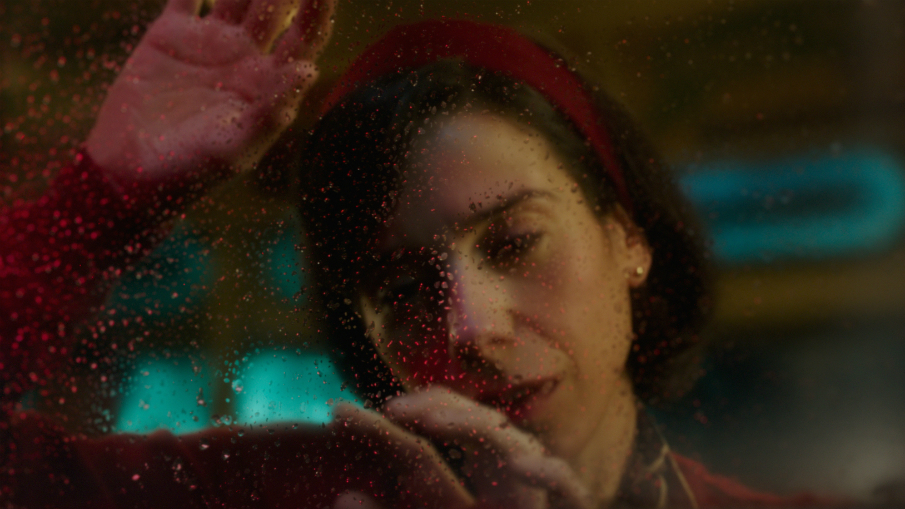Unable to perceive the shape of him, she find him all around her. His presence fills her eyes with his love. It humbles her heart. For he is everywhere. Paraphrasing the poem that closes out The Shape of Water reflects the greatness of Sally Hawkins’ performance as Elisa, the princess without voice. Hawkins’ performance is one of movement, responding to her environment and using her body to communicate with a world that does not understand her. Elisa has a peaceful existence, but the introduction of the Asset (Doug Jones) into her life, the amphibian man being unfairly treated in the lab facility at which she works, makes her feel untapped feelings. It humbles her heart. What Hawkins is able to express in playing a mute character, a person who never utters a single word in the entire film, is so much greater than any dramatic monologue could ever express.
The Shape of Water wears its heart on its sleeve and it is not subtle or cynical about its themes of love and compassion, much like a fairy tale. Director and co-writer Guillermo del Toro has said that the film is a “fairy tale for troubled times,” and the heroine at its center is a classic doomed lover, who falls truly, madly, deeply for an outsider like her against the backdrop of a constricting world. It is 1962 America, a time in which it was a great time to be a straight white man but hell for everyone else, just before the sexual and cultural revolution. Hawkins plays Elisa as the kind of protagonist you would see in movies of this period, at times melodramatic in her facial expressions yet defiant in knowing what they want. Of course, it is exceedingly rare to have a mute character at the center of a movie now let alone then, so this gives the audience a feeling of discovery yet familiarity.
Hawkins never plays Elisa like a victim of circumstance, as so many actresses probably would. Her Elisa is perfectly happy with her little world, pleasuring herself in the morning, mopping the floors at the facility and enjoying the company of next door neighbor Giles (Richard Jenkins) and fellow janitor Zelda (Octavia Spencer). There is often a playful smile on her face, and it is unclear if her expression is a coping mechanism or simply her personality shining through. We do not get much of Elisa’s backstory, and yet we feel like we know her on an intimate level. There is an old soul weightiness in her eyes, of someone who has seen so much but must continue onward for her own survival and happiness. Just look at the scene in which she desperately pleads to Giles in her own way to help rescue the Asset from the facility. The anguish on her face is so palpable that she may as well be screaming. In another scene she is clinging to the Asset in the bathroom. The look she gives Giles from afar is that of a woman in charge of herself feeling fully confident for the first time in her life and practically daring him to do something about it. This one look is so much more powerful than any one line of dialogue could express, and it all comes down to her performance.
Throughout this award season, Hawkins has picked up numerous critics prizes, most notably from the Los Angeles Film Critics Association, but has not earned one of the big ones. While nominated at every televised award show, she has continuously lost to Frances McDormand in Three Billboards Outside Ebbing, Missouri. I would never begrudge the work of a true acting thespian like McDormand, nor would I say her wins at the Critics’ Choice, Golden Globe and SAG Awards are undeserved. Yet, there is something special at work here with Hawkins that should not go unrewarded. It is an intangible magic, both a throwback to the past and an entirely new creation. In many ways this is a very musical, theatrical performance, not unlike recent Best Actress winners like Emma Stone in La La Land and Natalie Portman in Black Swan, while also hearkening back to legendary actresses like Betty Grable and Ginger Rogers. The Shape of Water earned 13 Oscar nominations, more than any other film from 2017, and I would argue that they would not have gotten anywhere near this number if it weren’t for Hawkins. It is Hawkins that holds the entire film together. It is on her shoulders that the film’s true emotional resonance falls. She is the beating heart that helps spring The Shape of Water to life, and even as you leave the film, you feel her all around you.
Oscar years come and go, and the “right” performances don’t always win, and there isn’t much you can do about it. Regardless of whether the Academy rewards Hawkins with the Best Actress Oscar, her performance will live on as future generations fall in love with the curious tale of the princess without voice.

